- Home
- Amelia C. Adams
Butterfly Kisses
Butterfly Kisses Read online
Butterfly Kisses
Belles of Wyoming Book 24
by Amelia C. Adams
With thanks to my beta readers—Amy, Cindy, Dorothy, Joseph, Mary, Robin, Rose, Sandy, Shelby, Suzy, Teresa, Theresa, Renee G., and Renee L.
Cover design by Virginia McKevitt
Would you like to join my readers’ group on Facebook? Click here!
Make sure to catch all the other books in the Belles of Wyoming series by clicking here!
The Belles of Wyoming Series Page
Christmas 2018 (Theme: Holiday)
Book 1. Christine Sterling, Wynter’s Bride
Book 2. Marianne Spitzer, Holly's Christmas Wish
Book 3. Cyndi Raye, A Tin Star for Christmas
Book 4. P. Creeden, A Pony for Christmas
Book 5. Julia Ridgmont, Natalie's Surprise Engagement
Spring 2019 (Theme: Renewal/Redemption)
Book 6. Christine Sterling, The Homecoming
Book 7. Ginny Sterling, Blessings of Love
Book 8. Cyndi Raye, Mercy’s Gift
Book 9. P. Creeden, Moments of Grace
Book 10. Julia Ridgmont, Emeline's Redemption
Summer 2019 (Theme: Summer Love)
Book 11. Ginny Sterling, Lightning Strikes Twice
Book 12. Julia Ridgmont, In the Nick of Time
Book 13. Jenna Brandt, June’s Remedy
Book 14. Lynn Donovan, The Wrong Bride
Book 15. Marisa Masterson, Grace for a Drifter
Book 16. R. Castro, Lupe’s Luck
Book 17. P. Creeden, Blue Steel
Book 18. Cyndi Raye, Stealing Her Heart
Book 19. Cheryl Wright, Eleanor’s Dilemma
Book 20. Jo Grafford, Wild Rose Summer
Book 21. Patricia PacJac Carroll, Summer’s Love
Book 22. Lisa M. Prysock, The Prairie Princess
Book 23. Marie Higgins, Whispers of Yesterday
Book 24. Amelia Adams, Butterfly Kisses
Book 25. Margaret Tanner, Flynn's Debt
Book 26. Mimi Milan, September’s Switch
Book 27. Julia Ridgmont, Daring to Love Again
Book 28. Christine Sterling, A Matter of Marriage
Book 29. Ginny Sterling, Change of Heart
Book 30. Christine Sterling, The Barn Raising
Table of Contents:
Chapter One
Chapter Two
Chapter Three
Chapter Four
Chapter Five
Chapter Six
Epilogue
Chapter One
Belle, Wyoming
1881
“Mariposa?”
Mariposa Granger looked up from the book she was reading. She was supposed to be unpacking this crate, but it was impossible not to take a short break when she saw the spine of one of her favorite novels. “Yes, Aunt Ellen?”
“I need you to go over to the mercantile for me, please. I can’t make bread without salt—I learned that the hard way a long time ago.”
Mariposa smiled. Aunt Ellen was always making self-deprecating remarks about her cooking, but it was the finest Mariposa had ever tasted. “I’m on my way.”
“Oh, and a few bars of soap, please. There’s some money in my bag on the table.”
Mariposa stood up and stretched. She’d been unpacking crates all morning, and her back was stiff and sore. A walk was just what she needed.
She found the money, then put on her bonnet and headed out into the warm summer sunshine.
Belle, Wyoming, was the smallest place Mariposa had ever lived, and that was saying something. It had the basic amenities, but not a great deal beyond that. She didn’t know what Aunt Ellen had been thinking, bringing them to live out here miles from the train station and even farther from the fort. Then again, she never had understood Ellen’s desire to move so constantly, never putting down roots, picking up and leaving just as they started to get comfortable.
When Mariposa had been younger, she’d asked Ellen about it, wondering why they never spent two Christmases in the same house or why they never went back to visit the towns where they’d once lived. Ellen usually changed the subject, but one day when Mariposa was nine, she put down the brush she’d been using to fix Mariposa’s hair and sat down next to her.
“Do you remember yesterday when we were out for our walk, and we saw those men carrying loads of bricks in their wheelbarrows?”
“Yes,” Mariposa said.
“Do you think you could push one of those wheelbarrows?”
“No! They were bigger than me!”
Ellen smiled. “That’s right. They were bigger than you, and probably weighed more than four of you put together. If you tried to push one, you could get hurt. Only someone very strong should try it, don’t you think?”
“But I wasn’t trying to push a wheelbarrow. I was asking about Christmas.”
“I know, sweetheart, but listen. Sometimes knowledge can be heavy, just like those wheelbarrows, and there are some pieces of knowledge that little girls shouldn’t try to handle on their own. You should leave it to someone older and stronger to handle so you don’t get hurt.”
Mariposa didn’t understand, but it was the closest thing she’d ever gotten to an answer, so she decided to be grateful for it and stop pressing the issue.
Ten years later, she was still without answers, wondering if it had been long enough and she could ask again.
She lifted her face to the sun, feeling the warmth of the light on her skin. Ellen was always telling her to keep her face in shadow during the summer so she’d have fewer wrinkles when she got older, but sometimes she just had to absorb the rays. They reached down into her soul like few other things did—well, except firelight. She loved firelight too, and again, Ellen cautioned her not to get too close to that. Gracious. Why did so many things have to cause wrinkles?
“Oh, my! Aren’t you a pretty thing?”
Mariposa opened her eyes and blinked. A woman perhaps fifteen years older than herself stood before her dressed in green-sprigged calico. “Hello, my dear. I’m Lucy Mae Jackson. Miss Jackson, not Mrs., although that’s a story we’ll save for another day. Are you new in town? I don’t recall seeing you before, and I know just about everyone in Belle.” She paused, then laughed. “Correction—I know everyone in Belle.”
“It’s nice to meet you, Miss Jackson. I’m Mariposa Granger, and yes, my aunt and I just arrived yesterday.”
“Well, I must say, I couldn’t be more pleased. Our little town may not seem like much now, but it’s certainly growing, and good folks like you make it possible. Are you married? Promised?”
“Neither.”
Miss Jackson’s eyes began to shine. “Well, let me keep my ears open for any eligible young men who might be interested, all right? A few names already come to mind, but I’m not sure if they’ve already set their caps for someone.”
“Oh, I don’t need you to find me a beau,” Mariposa stammered. A beau was the last thing she wanted just then—she hadn’t even finished unpacking the parlor.
“You’re certainly pretty enough that you don’t need my help, but sometimes love just needs a little push.” Miss Jackson laughed. “Never mind, dear—I can see that I’ve scandalized you. I’ll ease up a bit, but if you change your mind, come find me.”
“I . . . I will,” Mariposa replied, nodding her goodbye and continuing on her way. That had certainly been a most unusual encounter.
When she stepped into the mercantile, she inhaled, picking up on the scents of coffee, lemon drops, peppermint, and soap. Every general store the country over had this same smell, and she loved it because it created a sense of belonging no matter where she lived. It was a constant, something she could count on.
A group of young ladies stood over by the sewing notions comparing two bolts of fabric. They smiled at her and said hello, and she greeted them in return. She’d introduce herself to them later—she knew Ellen wanted to get on with her breadmaking and wanted her salt as soon as possible. She found it rather quickly, along with the soap, and approached the counter.
“Hello,” she said, placing her items in front of the clerk. He looked up at her with some surprise.
“Hello,” he replied. “You must be new in town.”
“Yes, that’s right. My aunt and I just arrived yesterday.”
“Welcome to Belle.”
She expected him to follow up with all the usual questions—where did they live before, what brought them out this way—but he simply marked down her purchases and quoted a price. She handed him the money, and he gave her a nod. “Very good, Miss . . . uh . . .”
“Granger.”
“Miss Granger. I’m Henry Stewart, and my wife’s name is Livvy. You be sure to let us know if you need anything else.”
“Thank you. I will.”
Mariposa gave a farewell smile to the group of young women, hoping they’d understand that she was in a hurry and didn’t mean to seem unfriendly, then made her way back to the house.
She and Ellen had been lucky to find the house so quickly. A man and his wife had just finished building it when they got news that his father was dying, and they had to leave for Kentucky right away. Ellen happened to overhear the conversation, and a few minutes later, everything was arranged. She had a magic touch that way, always making things turn out for the best.
“I’m back,” Mariposa called out as she hung her bonnet on the peg near the door. “I got the soap and the salt you wanted.”
“Thank you,” Ellen replied from the kitchen. “We’ll head back tomorrow and stock up, but that will be enough to keep us going until then.”
“I saw a lot of people my age in town,” Mariposa said as she tied on her apron. “That surprised me—I guess I thought everyone would be a little older.”
“That’s good. You might make some friends here.” Ellen nodded toward the carrots on the table. “Please scrape and chop those—we’re having stew.”
Mariposa got to work, a question on the tip of her tongue that she didn’t ask. She’d had friends before—she’d had lots of friends—but then she and her aunt would move. What good would it do to make friends here? It seemed like such a waste to get to know someone only to say goodbye such a short time later. She hadn’t bothered to make friends at all the last place they’d lived, and it almost seemed easier—there were no hearts to be broken or tears to be shed. It was as simple as packing up the crates and putting them in the back of the wagon. With Ellen’s comment about making friends, though, she had to wonder—would they be staying this time?
What would that be like—to go to church every week with the same people, to learn their names and know their histories, to attend a couple’s wedding and then a year later, their child’s christening? Mariposa loved the idea of creating friends who would last a lifetime, but it would certainly be different from anything she’d experienced before, and she’d likely have to get used to it.
After they ate their simple dinner and washed the dishes, they climbed the stairs and went to their bedrooms—Mariposa’s on the right and Ellen’s on the left. Another day and they should have everything put together. That was one nice thing about renting a small home and only having a few belongings—settling in never took long.
She changed into her nightclothes, said goodnight to the picture of her mother that always sat on her nightstand, and climbed beneath the covers. She wished she had a picture of her father, but Ellen said the only photograph they had of him had been damaged when the roof leaked during a rainstorm. Mariposa often wondered what he looked like—if he was tall and handsome, or maybe a little shorter and merely pleasant to look at. She refused to consider the possibility that he might have been homely—who imagines themselves with a homely father?—and instead, every good trait she saw in men around town, she placed on him. In her mind, he was intelligent and musical and witty, generous and friendly, and perhaps he had just the smallest little bit of a mustache.
She didn’t have to guess about her mother. Not only did she have a photograph, but Ellen, being her mother’s sister, was more apt to talk about her from time to time. Hardly ever when Mariposa asked, but randomly, perhaps on a holiday or when Ellen saw something that reminded her of the past. Mariposa drank those memories up like a flower drinking dew. If only . . . If only.
***
By mid-morning of the next day, the house was finished, and Ellen proclaimed it was time to go to the mercantile. She carefully tied the broad ribbons of her bonnet under her chin and picked up her shopping basket, reminding Mariposa the whole time to be quick.
“I’m sorry, Aunt Ellen,” Mariposa said, fumbling with the ribbons of her own bonnet. “I got caught up in . . . in something.”
“In reading the novels instead of putting them away. I know.” Ellen sighed, then took hold of Mariposa’s ribbons herself and began to tie them. “It’s my own fault for bringing them with us, but how could I leave them behind when you love them so?”
“You wouldn’t actually leave them, would you, Aunt Ellen?” The thought was too much for Mariposa to comprehend. How . . . how does one just leave books behind? It would be like abandoning a basket of kittens in the middle of the woods.
“Of course not. I’ll just resign myself to the knowledge that it will take twice as long as it ought to unpack the bookshelves.”
Hmm. That didn’t sound like they were staying here in Belle . . . Mariposa pushed the thought from her mind. She’d known it was too good to be true, and there was no sense in allowing herself even a flicker of disappointment. “Just think,” she said lightly. “Someday, I’ll have the books memorized and won’t be tempted.”
Ellen fixed her with a look. “There are two flaws in that thinking, my dear. First, we continue the nasty habit of buying more books. Second, there’s no such thing as temptation losing its grip on you—not where books are concerned.” She gave Mariposa’s bonnet a final adjustment. “Now, let’s go before one of the novels in question leaps off the shelf, lands at your feet, and insists on being read this minute.”
Mariposa laughed. “Yes, we’d better hurry—that’s likely to happen any minute.”
The people they passed on their walk greeted them courteously, men doffing their hats and women giving them nods. Mariposa didn’t see many horses and carriages—most everyone seemed to be out and about on foot, enjoying the beautiful weather.
Mr. Stewart smiled when they entered the mercantile. “Welcome back,” he said, putting down the box of thread he’d been shelving. “This must be your aunt.”
“Yes, Mr. Stewart. This is Ellen Granger.”
The man gave Ellen a polite bow. “Welcome to Belle, Mrs. Granger. We’re so glad to have you here.”
“It’s Miss Granger, actually, and thank you. This is such a pleasant community.”
He seemed momentarily flustered by the correction of her name, but blinked and then smiled. “It is indeed. Now, tell me—how can I help you?”
“We need quite a few things, actually, considering that we just moved in. Perhaps you can teach me the way around your store.” Ellen pulled out her list, and she and Mr. Stewart began to discuss it. Mariposa tried to listen—did her best to care—but her attention was pulled to the large glass window at the front of the store and to a young man she’d just seen disappear into the small crowd milling about. He looked familiar, but that didn’t seem likely at all. She and her aunt had never lived in this part of Wyoming before, and she’d never heard of this town until they arrived here.
“What do you think, Mariposa?”
She turned and saw Ellen holding up the ends of two different bolts of cloth. “For the curtains?”
“Yes. I thought either of these would do, but I can’t decide which
.”
“I like the blue,” Mariposa said, not much caring, but knowing that if Ellen wasn’t given a strong opinion, she’d spend several minutes trying to decide, and then she still wouldn’t be sure of herself. For some reason, Ellen struggled to make seemingly unimportant decisions, even when she was as fixed as an arrow when it came down to the things that did matter.
“Blue it is.” Ellen smiled, obviously glad to have that dilemma resolved, then moved on to choosing out some thread. Mariposa turned back to the window, hoping for another glimpse of that man so she could set her mind at ease, but he was nowhere to be found, and of course by the time they were finally on their way, there was no hope of catching up with him whatsoever.
It really didn’t matter, she told herself. She didn’t have a clear view of his face and she wasn’t even sure who he reminded her of—she just had a flash of recognition, and then it was gone. She’d likely had too little sleep the night before, or perhaps her imagination was still caught up in the novel she’d been reading earlier.
They carried their parcels home, assuring Mr. Stewart they could manage. “The next time we do that,” Mariposa said, nearly dumping her armload onto the kitchen table, “we’re either going to accept his help with a delivery, or we’re going to buy one of those small goats like they have in South America that we can load up to do our carrying for us.”
Ellen looked at her quizzically. “Goats?”
“Yes. I read a fascinating article in a magazine a few months back without realizing it was applicable to our situation. You see, these families breed goats and raise them in the house alongside their children, and as they get older, they can use them to haul small loads. Wouldn’t that be a great help?”
“I’ll start putting away the food while you pen a letter to one of these South American families asking them to send us a goat.”
Mariposa grinned. “Or I could help you first. The mail won’t go out again until tomorrow—I can spare a few minutes.”
“I’m very glad to hear that.”

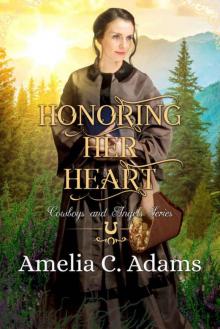 Honoring Her Heart
Honoring Her Heart Buttons and Bows
Buttons and Bows An Agent for Emily
An Agent for Emily Christmas Catch-Up VIII (River's End Ranch)
Christmas Catch-Up VIII (River's End Ranch) A Rancher for Rowena
A Rancher for Rowena Candice (Seven Sisters Book 6)
Candice (Seven Sisters Book 6) Butterfly Kisses
Butterfly Kisses A Stitch in Time
A Stitch in Time Buttons and Bows (The Sewing Circle Book 3)
Buttons and Bows (The Sewing Circle Book 3) Sidearms and Songbirds (Hearts of Nashville Book 3)
Sidearms and Songbirds (Hearts of Nashville Book 3) Herd to Breathe
Herd to Breathe The Ties That Bind
The Ties That Bind Rhyme or Reason
Rhyme or Reason Revelations (Brody Hotel Book 4)
Revelations (Brody Hotel Book 4) Phoebe's Fate (Burnt River Contemporary Western Romance Book 9)
Phoebe's Fate (Burnt River Contemporary Western Romance Book 9) And Something Blue (Main Street Merchants Book 1)
And Something Blue (Main Street Merchants Book 1)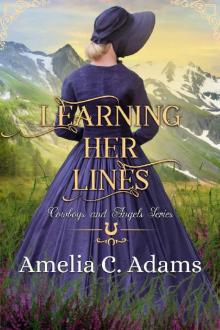 Learning Her Lines
Learning Her Lines Connections
Connections The Turn of a Wheel (Kansas Crossroads Book 17)
The Turn of a Wheel (Kansas Crossroads Book 17) Just Desserts (Main Street Merchants Book 4)
Just Desserts (Main Street Merchants Book 4) An Agent for Anna
An Agent for Anna An Agent for Esme
An Agent for Esme A Handyman for Helen
A Handyman for Helen Scented Sensibility
Scented Sensibility Addie's Adventurer
Addie's Adventurer Defying the Darkness
Defying the Darkness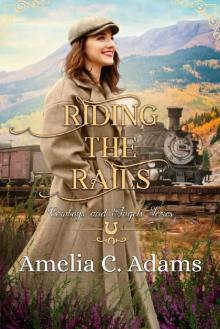 Riding the Rails
Riding the Rails Sugar And Spice (Main Street Merchants Book 7)
Sugar And Spice (Main Street Merchants Book 7) An Agent for Cynthia
An Agent for Cynthia In The Stars (Main Street Merchants Book 6)
In The Stars (Main Street Merchants Book 6)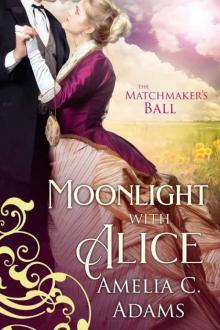 Moonlight With Alice (The Matchmaker's Ball Book 3)
Moonlight With Alice (The Matchmaker's Ball Book 3) Five Golden Rings (Main Street Merchants Book 3)
Five Golden Rings (Main Street Merchants Book 3) Between The Lines (Main Street Merchants Book 5)
Between The Lines (Main Street Merchants Book 5) An Agent for Lucy
An Agent for Lucy Jessica (Seven Sisters Book 2)
Jessica (Seven Sisters Book 2) A Passing Glance
A Passing Glance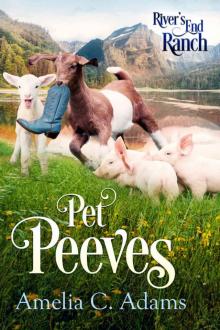 Pet Peeves
Pet Peeves RNWMP: Bride for Joel
RNWMP: Bride for Joel Bowing to Betsy (The Matchmaker's Ball Book 11)
Bowing to Betsy (The Matchmaker's Ball Book 11) Rebekah (Seven Sisters Book 4)
Rebekah (Seven Sisters Book 4) A Joyful Noise (Kansas Crossroads Book 14)
A Joyful Noise (Kansas Crossroads Book 14) Her Second Chance Hometown Groom
Her Second Chance Hometown Groom A Christmas Promise (Kansas Crossroads Book 16)
A Christmas Promise (Kansas Crossroads Book 16) Bride for Samuel
Bride for Samuel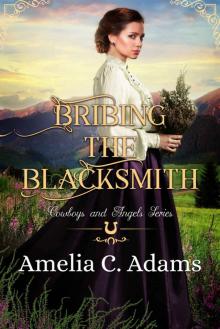 Bribing the Blacksmith (Cowboys and Angels Book 9)
Bribing the Blacksmith (Cowboys and Angels Book 9) RNWMP: Bride for Samuel (Mail Order Mounties Book 12)
RNWMP: Bride for Samuel (Mail Order Mounties Book 12) Tea for Two
Tea for Two The Bitter and the Sweet (Kansas Crossroads Book 9)
The Bitter and the Sweet (Kansas Crossroads Book 9) Frank (Seven Sons Book 6)
Frank (Seven Sons Book 6) A Cattleman for Cora
A Cattleman for Cora Paislee's Path (River's End Ranch Book 48)
Paislee's Path (River's End Ranch Book 48) Accidental Agent (River's End Ranch Book 3)
Accidental Agent (River's End Ranch Book 3) Test of Time (Nurses of New York Book 5)
Test of Time (Nurses of New York Book 5) RNWMP: Bride for Michael (Mail Order Mounties Book 24)
RNWMP: Bride for Michael (Mail Order Mounties Book 24) Loving the Landlord
Loving the Landlord The Dark and the Dawn (Kansas Crossroads Book 3)
The Dark and the Dawn (Kansas Crossroads Book 3) Candy Crush
Candy Crush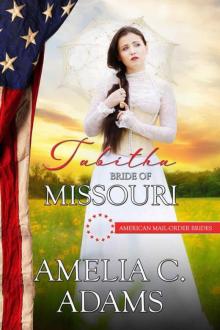 Tabitha: Bride of Missouri (American Mail-Order Bride 24)
Tabitha: Bride of Missouri (American Mail-Order Bride 24) Touch of Tenderness (Nurses of New York Book 3)
Touch of Tenderness (Nurses of New York Book 3) Lucky Lifeguard (River's End Ranch Book 28)
Lucky Lifeguard (River's End Ranch Book 28) Heartstrings (Brody Hotel Book 2)
Heartstrings (Brody Hotel Book 2) Heart of Hearts (Nurses of New York Book 4)
Heart of Hearts (Nurses of New York Book 4) Hope_Bride of New Jersey
Hope_Bride of New Jersey A Careless Wind (Kansas Crossroads Book 7)
A Careless Wind (Kansas Crossroads Book 7) An Agent for Emily (The Pinkerton Matchmaker Book 28)
An Agent for Emily (The Pinkerton Matchmaker Book 28) A Twisted Fate
A Twisted Fate Delivering Destiny (River's End Ranch Book 23)
Delivering Destiny (River's End Ranch Book 23)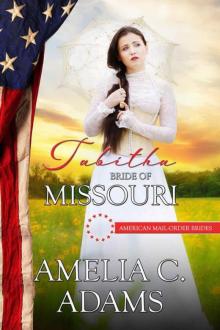 Tabitha_Bride of Missouri
Tabitha_Bride of Missouri A Wrangler for Wynonna
A Wrangler for Wynonna RNWMP_Bride for Peter
RNWMP_Bride for Peter An Unspoken Dream (Kansas Crossroads Book 13)
An Unspoken Dream (Kansas Crossroads Book 13) Generations
Generations Utah Sunrise (Rocky Mountain Romances Book 1)
Utah Sunrise (Rocky Mountain Romances Book 1) Bride for Jonathan
Bride for Jonathan Bribing the Blacksmith
Bribing the Blacksmith A Clean Slate (Kansas Crossroads Book 4)
A Clean Slate (Kansas Crossroads Book 4) Hope: Bride of New Jersey (American Mail-Order Brides 3)
Hope: Bride of New Jersey (American Mail-Order Brides 3) Rugged Rockclimber (River's End Ranch Book 8)
Rugged Rockclimber (River's End Ranch Book 8) RNWMP_Bride for Michael
RNWMP_Bride for Michael RNWMP: Bride for Joel (Mail Order Mounties Book 4)
RNWMP: Bride for Joel (Mail Order Mounties Book 4) Tea For Two (Cowboys & Angels Book 15)
Tea For Two (Cowboys & Angels Book 15) Sweet Georgia Peach
Sweet Georgia Peach RNWMP: Bride for Peter (Mail Order Mounties Book 20)
RNWMP: Bride for Peter (Mail Order Mounties Book 20) A Clear Hope (Kansas Crossroads Book 5)
A Clear Hope (Kansas Crossroads Book 5) Meredith's Mistake (Grandma's Wedding Quilts Book 4)
Meredith's Mistake (Grandma's Wedding Quilts Book 4) RNWMP_Bride for Samuel
RNWMP_Bride for Samuel The Whisper of Morning (Kansas Crossroads Book 6)
The Whisper of Morning (Kansas Crossroads Book 6) RNWMP: Bride for Jonathan (Mail Order Mounties Book 8)
RNWMP: Bride for Jonathan (Mail Order Mounties Book 8) Santa's Shopkeeper (River's End Ranch Book 18)
Santa's Shopkeeper (River's End Ranch Book 18) A Broken Wing (Kansas Crossroads)
A Broken Wing (Kansas Crossroads)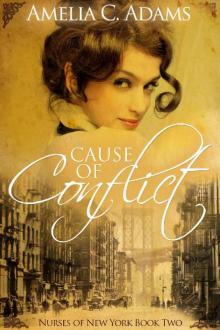 Cause of Conflict (Nurses of New York Book 2)
Cause of Conflict (Nurses of New York Book 2) A Free Heart
A Free Heart A New Beginning
A New Beginning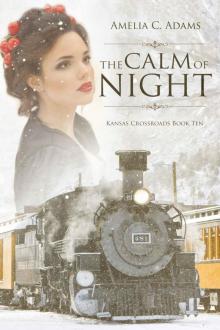 The Calm of Night (Kansas Crossroads Book 10)
The Calm of Night (Kansas Crossroads Book 10) Bride for Calvin
Bride for Calvin Sea of Strangers (Nurses of New York Book 1)
Sea of Strangers (Nurses of New York Book 1)